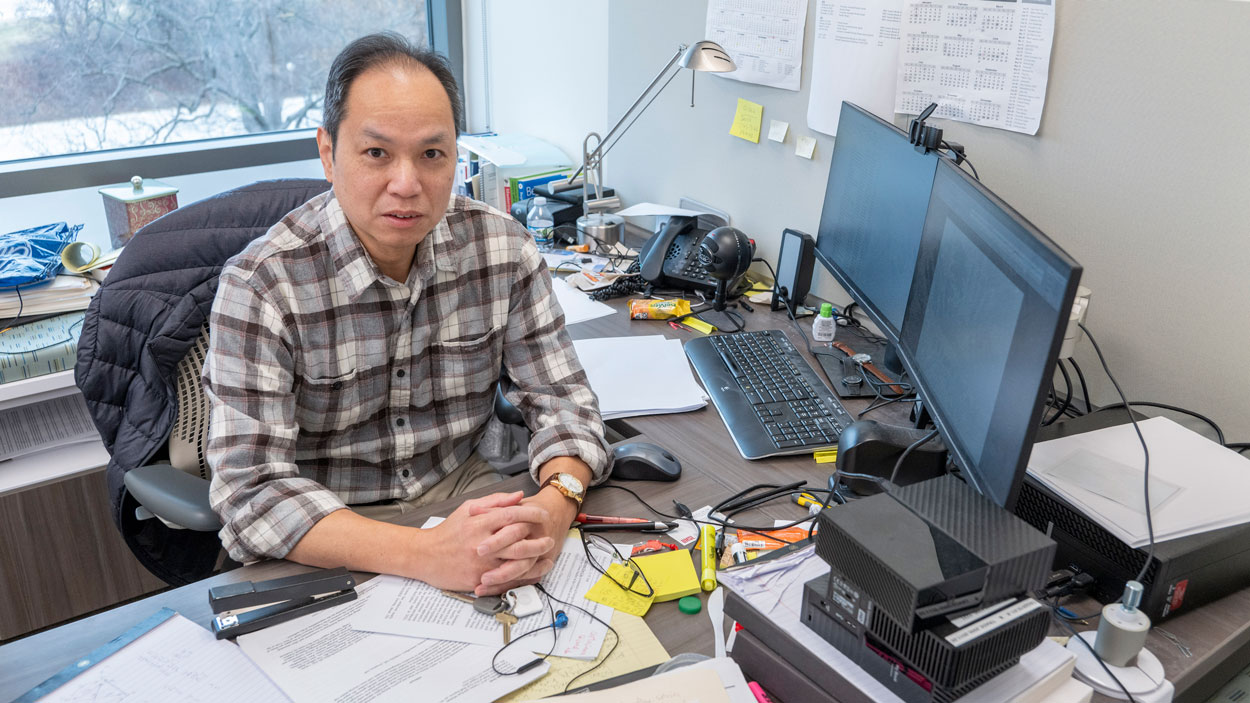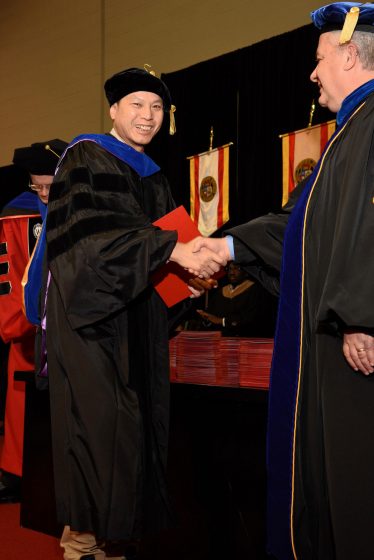
Yiuman Tse, an endowed professor of finance, went back to school to earn a master’s degree in computer science nearly three decades after completing his PhD. (Photo by Derik Holtmann)
Yiuman Tse assumed he’d made his last walk across a commencement stage 30 years ago when he earned his PhD in finance from Louisiana State University.
He’s gone on to have a sterling career in academia, with faculty appointments at the University of Memphis, Binghamton University, the University of Texas at San Antonio and, since 2012, as the Peter Schick Endowed Professor of Finance at the University of Missouri–St. Louis.
Tse has been lauded for his teaching and been a prolific researcher at every stop, authoring more than 130 peer-reviewed articles with collaborators around the world, many of them in leading journals with much of that work focusing on international investments. In 2021, Stanford University included Tse on its list of the world’s top 2% of most-cited scientists.
But despite those credentials, Tse found himself confronting a sense of inadequacy while teaching a graduate course in financial technology to a cohort of working professionals enrolled as MBA students in UMSL’s College of Business Administration in the spring of 2020.
“The course covers some data science and AI topics,” Tse said. “At that time, there were some students who had a very good technology background, and I realized I may not have enough knowledge to handle this class.”

Yiuman Tse shakes hands with Provost Steven J. Berberich during his walk across the commencement stage last month at the Mark Twain Athletic Center.
He decided he needed to learn more about programming language and enrolled in a course in computer science. One class became two and then another, and he suddenly found himself joining the master’s program in the Department of Computer Science.
Last month, Tse completed his degree, taking part in the commencement ceremony for the College of Arts and Sciences and walking across the stage at the Mark Twain Athletic Center.
“It was very exciting,” Tse said. “I was more excited than 30 years ago.”
He’d had some trepidation returning to the role of student.
For starters, Tse’s teaching and research kept him plenty busy, so he wasn’t sure how much time he’d have to devote to his studies. He had to rearrange his schedule when he had to accommodate in-person classes.
Tse also felt a little uneasy being back in the classroom, surrounded by students who often were less than half his age.
“It was kind of embarrassing,” he said.
Three decades of teaching didn’t necessarily make it easier when he once again found himself completing assignments and taking tests.
“I thought I’d just try one semester and see what happened,” Tse said. “It was more difficult than I thought. I remember that first quiz or exam. I was quite nervous, and I didn’t do well.”
At multiple points in the past three years, Tse considered quitting. But every time he learned something new and useful in one of his courses, he was motivated to stick with it and eager to learn more.
He recalled participating in a group discussion during a course on deep learning. It felt a little awkward not to be guiding the dialogue as the professor, but he found himself gaining a lot of valuable insight from talking through things with his fellow students.
“At that moment, I realized that I’m a student,” Tse said. “I just have to enjoy the process, relax. The group discussion during the class is really quite a transition.”
Tse still had anxious moments, particularly as he got closer to completing his degree.
Last semester, he joined Voices of Jubilation community gospel choir to give himself an outlet from the stress of school, the way singing had once helped him as a student in his native Hong Kong, long before he ever started planning for a life in academia.
Tse did not tell his own students about his degree pursuit. In part, he didn’t want them knowing if he ultimately decided not to follow through. He also didn’t go out of his way to alert his classmates to his day job, unsure what they’d think.
But he’d sometimes let it slip to his course instructors out of concern for what they’d think if they found out and he hadn’t said anything. Often, they were moved by his dedication.
“During my initial interaction with Yiuman, I was immediately impressed by his genuine enthusiasm for learning,” said Associate Professor Badri Adhikari, who taught that course in deep learning. “At UMSL, he is among the icons who demonstrate the value of life-long learning and who make our campus an inspiring place for all learners and educators. Despite his exceptional academic achievements and wealth of experiences, Yiuman approached my classes with the same eagerness as any other student and was as humble as anyone could imagine. He inspires me. He is not only a successful educator but also a true learner.”
He had decided to pursue the degree to better inform his teaching. He also took away lessons from faculty members such as Adhikari about how to best convey difficult and abstract topics to his students.
What Tse hadn’t counted on was how building his understanding of computer science would enhance his research.
“I’ve been doing research in investment, and that’s also included data science or AI,” Tse said. “My co-authors had been doing the empirical work, but now I know more about what they are doing, so I can give them more opinions and generate more research ideas. It has really helped me.”
Maybe the biggest lesson Tse took from the pursuit of his degree was that his walk across the stage last month did not signal the end of his learning.
“My parents barely finished their sixth-grade education, but they always told me that education transforms lives and learning is a lifelong process,” Tse said. “Even now that I’ve graduated, I plan to take another course. So, learning never stops.”














